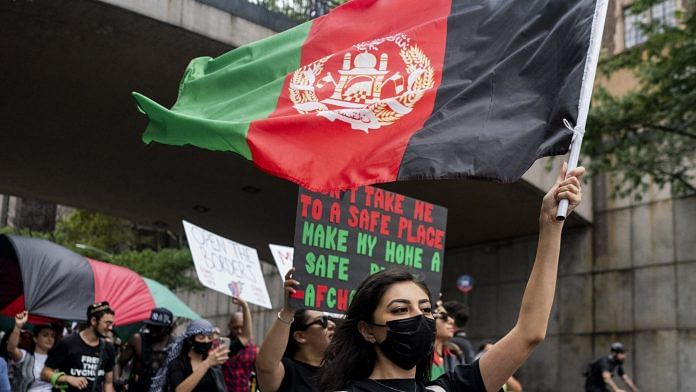Following the Taliban takeover in Afghanistan, American newsrooms have been saturated with outpourings about the nightmare awaiting Afghan women. The media machinery has led with the narrative of how America ‘rescued’ these women from the ‘barbaric’ treatment of the Afghan Taliban two decades ago; the decision to now ‘abandon’ them signals a retreat to savage times, to leave Afghan women to menacing, cliff-hanger prospects.
Afghan women faced violent injustice under Taliban rule; there were threats to girls’ education, attacks on sexual orientation, restrictions on public mobility to name a few, but the problem with the ‘saving’ mission is that it is laden with colonial missionary stereotypes. It relies on certain assumptions including a sense of superiority — American superiority — to do the ‘saving’, buttressed by the belief that white feminism is leading these Afghan women to the only possible future they envision for themselves.
Why has the ‘saving Muslim women’ mantra stuck, despite the oversimplification and condescension it reeks of? Because there’s something appealing about rescuing a lesser force, extricating them from prickly circumstances, hijacking their reclamation, instructing them on the precise freedoms they must demand to enter the ranks of modernity and its broad-minded brigade.
Armed with similar liberalism chants, celebrities and do-gooders swiftly joined the club of saviours for Afghanistan. From Laura Bush paving the way for the plight of Afghan women to be taken note of soon after 9/11, to Mavis and Jay Leno’s fundraiser campaign, American influencers publicly aired rage against the Taliban’s gender-based atrocities. In their wake, however, these well-intended ‘freeing’ crusades endorsed military intervention and air strikes in Afghanistan — culminating in a war that outlasted their home country’s direst predictions. Witnessing how the ‘tyranny of saving’ played out in global political theatres, military missions masquerading as rescue squads for Afghan women have proven difficult to digest.
Also read: US exit from Afghanistan could bring back ‘woefully inadequate’ cruise-missile diplomacy
But the problem with the white (wo)man’s burden runs deeper; ‘saving Afghan women’ hasn’t been free of white feminism’s blind spots. Such brands of cookie-cutter feminism, applied to Afghanistan and other countries, assume a gross generalisation of the complex political, historical and social trajectories that inform the cultural milieu of these societies. The top-down, one-size-fits-all strategy ignores differences among Muslim women — who are not a homogeneous bunch, nor any less capable of nurturing their own, homegrown feminist ranks. Their empowerment goals, the desire for a less oppressive future, may not identically match the ‘freedom’ peddled by white feminism — this difference in what agency might look like, appears to have been glossed over by the white saviours.
Therefore, before anything else could thrive in Afghanistan, American aid got in. Its motivation was swiftly crystallised — for Afghan women to believe they were in need of such saving. This meant short-circuiting the possibility of local women’s movements gaining ground, for if Afghan activism began to take on a life of its own, the white feminism project would eventually become redundant. It appears that being dispensable wasn’t the game plan; keeping Afghan women dependent on American intervention was.
The ‘saving’ project didn’t come without its regular pigeon-holing of religion either. Sexual terrorism had to have a face. This meant reinforcing neat connections between faith and gender violence, reducing the plight of Afghan women to the wrongdoing of controlling Muslim men — the only kind of men in these societies, a stereotype which gets you nowhere. Nonetheless, the temptation to subscribe to the caricatured, bearded, wife-beating fundamentalist was too strong to seriously reflect on deeper, more nuanced explanations — white feminism became a compulsory antidote to Muslim patriarchy.
Also read: ‘Liberate Kashmir’, al Qaeda tells Taliban but is silent on Uyghur Muslims in China’s Xinjiang
Today, marking two decades after the events of 9/11, the Americans may be heading home, but forfeiting front-row seats to the ‘save Afghan women’ mission seems much harder — which explains the Western media rioting around the issue. For anyone to deny the imminent threats that Afghan women face isn’t helpful, and the aspiration to encourage fellow women to collectively attack gender exploitation isn’t the problem — in fact, that’s precisely why coalitions are formed and allyship invitations extended.
But for white feminists these were the less attractive options to focus on — perhaps because allyship, unlike the saving project, is anti-status quo. It doesn’t rely on colonial vocabulary to salvage those, whose despair in part, we ourselves created; nor does it allow for power or privilege to prevail. It tries to bulldoze and disrupt them instead. For the saviours then, of what use is this allyship in Afghanistan?
Saba Karim Khan works at New York University’s campus in Abu Dhabi. Views are personal.
The article first appeared on Dawn website. It has been published with permission.



